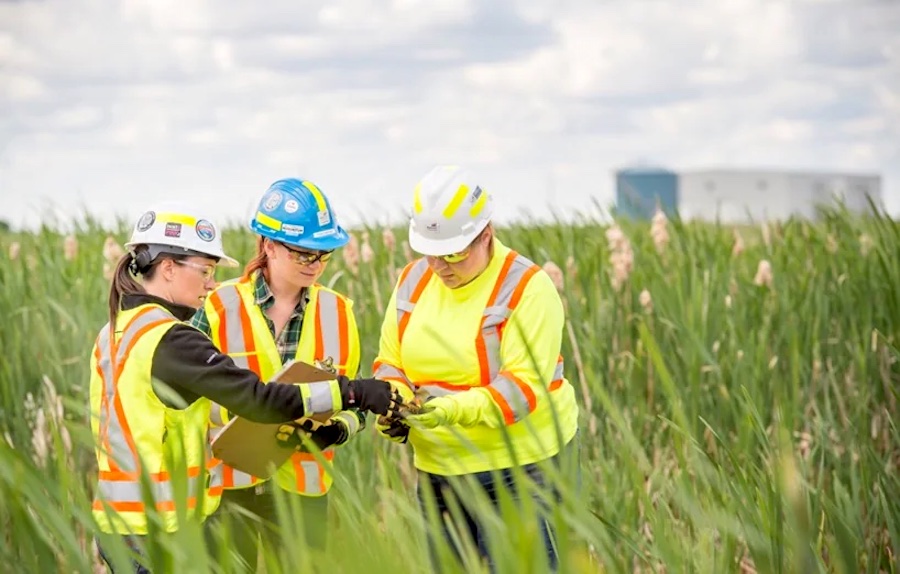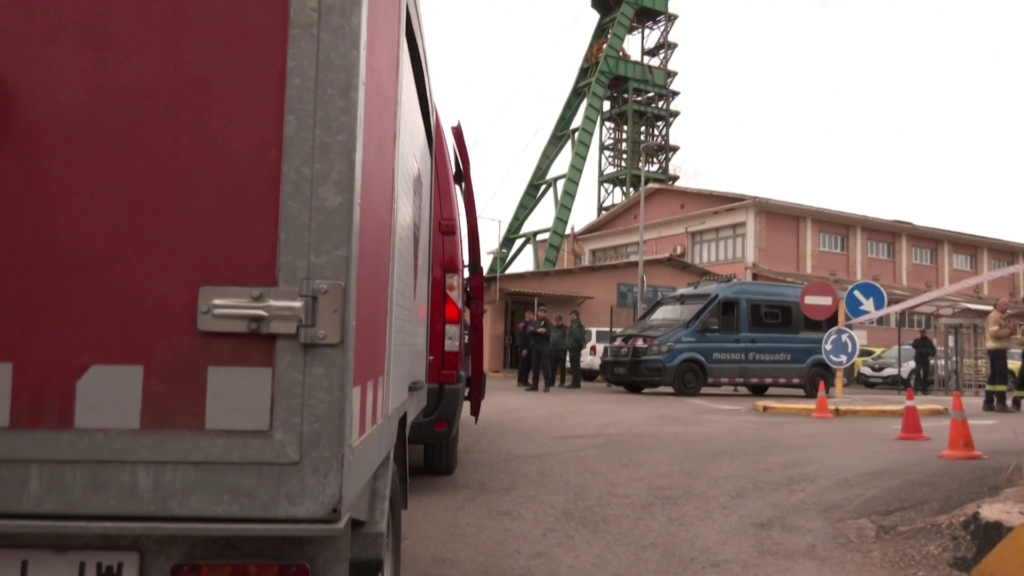Staff Writer | March 10, 2023 |

BHP to start potash production at Jansen in 2026. (Image courtesy of BHP.)
BHP (NYSE: BHP, ASX: BHP) announced Friday that as construction progresses at its Jansen potash project in Saskatchewan, it has awarded three new contracts in partnership with local First Nation communities.

Covering camp management, site services and raw ore/handling foundation, the contracts include representation from the six First Nations surrounding the Jansen site, with whom BHP has opportunity agreements in place.
The agreements, established in 2012, are a way that industry can forge new relationships with Indigenous Peoples to create local employment, business opportunities and build skills and capabilities of local residents.
“Across our operations, it is our ambition to create long-term relationships with Indigenous Peoples based on trust and mutual benefit – and these contract awards demonstrate this ambition in action,” chief commercial officer Vandita Pant said in the statement.
“By integrating local suppliers and Indigenous businesses into our supply chain we are working hand-in-hand with First Nation partners to build long-term positive outcomes for communities and for BHP.”
The three and a half year contracts are valued at over C$260 million ($187.8m), and will support more than 400 local jobs with over 50% planned to be Indigenous.
Since sanctioning Jansen Stage 1 in August 2021, a total of C$470 ($339.5m) million in contracts have been awarded to Indigenous businesses in the region, the miner said.
The camp management contract has been awarded to Wicehtowak Frontec Services, a joint-venture between ATCO Frontec Ltd. and George Gordon Developments Ltd. The joint venture was originally created in 2011 as a 50-50 partnership to support the construction of the Jansen Discovery Lodge, and today has evolved to a majority Indigenous-owned company.
The site services and raw ore/handling foundation contracts have been awarded to 2Nations Bird – a new partnership between Bird Construction Inc., Beardy’s and Okemasis Cree Nation’s Willow Cree Developments General Partner Inc., and Fishing Lake First Nation’s development corporation, FLFN Ventures.
2Nations Bird will work with KDM Constructors, who represent Kawakatoose, Day Star and Muskowekwan Nations, as well as George Gordon Developments Ltd, the economic development arm of the George Gordon First Nation.
“Indigenous and industry partnerships, such as these, create economic and employment opportunities for our Nation and its members,” said Chief Ananas of Beardy’s & Okemasis’ Cree Nation. “It also allows us to develop capacity, learn from one another, and grow in tandem. More importantly, these types of relationships are critical to advance economic reconciliation which allows us to develop long-term, meaningful, and sustainable outcomes.”
Operations at Jansen are anticipated to start in late 2026, and BHP is working with other Indigenous groups to identify jobs and skillsets and partnered with local organizations in Saskatchewan to provide pre-apprenticeship programs to help build awareness of opportunities in the trades and prepare individuals for the skills necessary to enter the mining industry.
“Through these programs we hope to attract more people who may not have considered a career in mining, particularly women and Indigenous people in the region,” the miner said.

BHP to start potash production at Jansen in 2026. (Image courtesy of BHP.)
BHP (NYSE: BHP, ASX: BHP) announced Friday that as construction progresses at its Jansen potash project in Saskatchewan, it has awarded three new contracts in partnership with local First Nation communities.

Covering camp management, site services and raw ore/handling foundation, the contracts include representation from the six First Nations surrounding the Jansen site, with whom BHP has opportunity agreements in place.
The agreements, established in 2012, are a way that industry can forge new relationships with Indigenous Peoples to create local employment, business opportunities and build skills and capabilities of local residents.
“Across our operations, it is our ambition to create long-term relationships with Indigenous Peoples based on trust and mutual benefit – and these contract awards demonstrate this ambition in action,” chief commercial officer Vandita Pant said in the statement.
“By integrating local suppliers and Indigenous businesses into our supply chain we are working hand-in-hand with First Nation partners to build long-term positive outcomes for communities and for BHP.”
The three and a half year contracts are valued at over C$260 million ($187.8m), and will support more than 400 local jobs with over 50% planned to be Indigenous.
Since sanctioning Jansen Stage 1 in August 2021, a total of C$470 ($339.5m) million in contracts have been awarded to Indigenous businesses in the region, the miner said.
The camp management contract has been awarded to Wicehtowak Frontec Services, a joint-venture between ATCO Frontec Ltd. and George Gordon Developments Ltd. The joint venture was originally created in 2011 as a 50-50 partnership to support the construction of the Jansen Discovery Lodge, and today has evolved to a majority Indigenous-owned company.
The site services and raw ore/handling foundation contracts have been awarded to 2Nations Bird – a new partnership between Bird Construction Inc., Beardy’s and Okemasis Cree Nation’s Willow Cree Developments General Partner Inc., and Fishing Lake First Nation’s development corporation, FLFN Ventures.
2Nations Bird will work with KDM Constructors, who represent Kawakatoose, Day Star and Muskowekwan Nations, as well as George Gordon Developments Ltd, the economic development arm of the George Gordon First Nation.
“Indigenous and industry partnerships, such as these, create economic and employment opportunities for our Nation and its members,” said Chief Ananas of Beardy’s & Okemasis’ Cree Nation. “It also allows us to develop capacity, learn from one another, and grow in tandem. More importantly, these types of relationships are critical to advance economic reconciliation which allows us to develop long-term, meaningful, and sustainable outcomes.”
Operations at Jansen are anticipated to start in late 2026, and BHP is working with other Indigenous groups to identify jobs and skillsets and partnered with local organizations in Saskatchewan to provide pre-apprenticeship programs to help build awareness of opportunities in the trades and prepare individuals for the skills necessary to enter the mining industry.
“Through these programs we hope to attract more people who may not have considered a career in mining, particularly women and Indigenous people in the region,” the miner said.
Three workers die in Spanish potash mine collapse
Reuters | March 9, 2023 |

The collapse at the mine in the town of Suria occurred just before 9 a.m. local time (0800 GMT) about 900 metres (984.25 yards) underground (Image Roasted Media.)
Rescue workers in northeastern Spain pulled out the bodies of three dead geologists from a collapsed tunnel hundreds of metres (yards) underground at one of Western Europe’s largest potash mines, Catalonian regional leader Pere Aragones said.

Two of the victims were students, one at the Polytechnic University of Catalonia (UPC), where a minute of silence was observed on Thursday afternoon, and the other at University of Barcelona, UPC said on its website.
One of them had started internship at the mine just six days earlier, according to Patricio Chacana, head of the local unit of Tel Aviv-based ICL Group Ltd, whose subsidiary Iberpotash operates the mine.
“We are in profound mourning for the death of three of our comrades,” he told reporters, adding that technicians had reviewed the structural integrity of 10 reference points that morning, as they do every day and the company would investigate what had caused the collapse.
The incident at the mine in the town of Suria, about 80 km (50 miles) north of Barcelona, occurred just before 9 a.m. (0800 GMT). The remaining workers at the mine were evacuated, officials said.
Firefighters had erected a large tent outside the mine, while the company’s flag was flying at half staff even before authorities confirmed the deaths, first announced by the regional union USOC.
“Unfortunately, we can confirm the deaths of three people who were working in the mine … their bodies have been recovered and identified,” Aragones told reporters in Suria.
Catalonia’s business department top official, Roger Torrent, said the mine had passed a safety inspection in February.
In December 2013, Iberpotash said two of its workers died after a mine collapse in Suria.
Local media reported that a worker had been struck by a rock and died in June 2020 at the company’s Vilafruns mine in Barcelona province. Three weeks later, a miner was killed in a similar accident. The Vilafruns mine was shut down that year.
Potash is used as a fertilizer in agriculture and as a raw material in industries such as pharmaceutical, explosives, glassmaking and chemicals.
Potash prices have soared in the past year after the European Union sanctioned major supplier Belarus over its support for Russia’s invasion of Ukraine.
(By Horaci Garcia, Nacho Doce, Joan Faus, Steven Scheer, David Latona, Aislinn Laing and Charlie Devereux; Editing by Inti Landauro, Angus MacSwan and Tomasz Janowski)
Reuters | March 9, 2023 |

The collapse at the mine in the town of Suria occurred just before 9 a.m. local time (0800 GMT) about 900 metres (984.25 yards) underground (Image Roasted Media.)
Rescue workers in northeastern Spain pulled out the bodies of three dead geologists from a collapsed tunnel hundreds of metres (yards) underground at one of Western Europe’s largest potash mines, Catalonian regional leader Pere Aragones said.

Two of the victims were students, one at the Polytechnic University of Catalonia (UPC), where a minute of silence was observed on Thursday afternoon, and the other at University of Barcelona, UPC said on its website.
One of them had started internship at the mine just six days earlier, according to Patricio Chacana, head of the local unit of Tel Aviv-based ICL Group Ltd, whose subsidiary Iberpotash operates the mine.
“We are in profound mourning for the death of three of our comrades,” he told reporters, adding that technicians had reviewed the structural integrity of 10 reference points that morning, as they do every day and the company would investigate what had caused the collapse.
The incident at the mine in the town of Suria, about 80 km (50 miles) north of Barcelona, occurred just before 9 a.m. (0800 GMT). The remaining workers at the mine were evacuated, officials said.
Firefighters had erected a large tent outside the mine, while the company’s flag was flying at half staff even before authorities confirmed the deaths, first announced by the regional union USOC.
“Unfortunately, we can confirm the deaths of three people who were working in the mine … their bodies have been recovered and identified,” Aragones told reporters in Suria.
Catalonia’s business department top official, Roger Torrent, said the mine had passed a safety inspection in February.
In December 2013, Iberpotash said two of its workers died after a mine collapse in Suria.
Local media reported that a worker had been struck by a rock and died in June 2020 at the company’s Vilafruns mine in Barcelona province. Three weeks later, a miner was killed in a similar accident. The Vilafruns mine was shut down that year.
Potash is used as a fertilizer in agriculture and as a raw material in industries such as pharmaceutical, explosives, glassmaking and chemicals.
Potash prices have soared in the past year after the European Union sanctioned major supplier Belarus over its support for Russia’s invasion of Ukraine.
(By Horaci Garcia, Nacho Doce, Joan Faus, Steven Scheer, David Latona, Aislinn Laing and Charlie Devereux; Editing by Inti Landauro, Angus MacSwan and Tomasz Janowski)
No comments:
Post a Comment